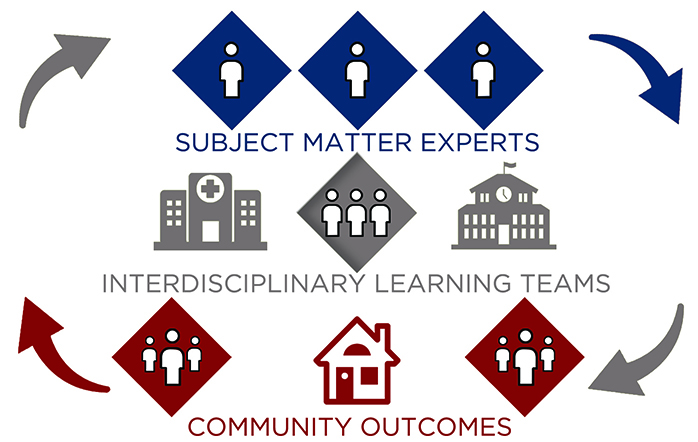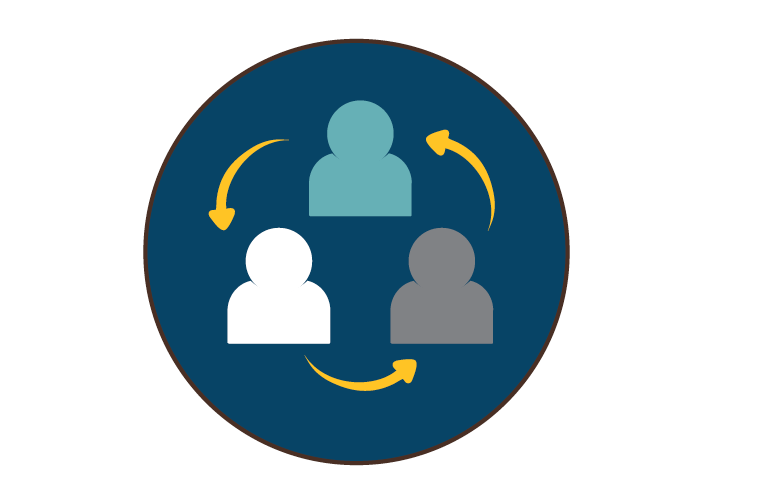Steps to Becoming a Replication Partner
Before You Start
Before you can start the process to launch an ECHO Program you first need to become a Replication Partner. Becoming an ECHO Replication Partner involves signing our Partnership Documents. You will then attend a required in-depth training where you will learn to implement the ECHO model in your community and gain insight on how to build a successful program. There is no fee to become a Replication Partner or to replicate the ECHO model.
Learn
Learn more about the ECHO model to see if it fits your needs. Explore our website and join us for a virtual introduction to ECHO Orientation to learn more. Orientation sessions can be scheduled to fit your schedule.
Orientation Sessions
Email Cari Glantz at cglantz@uwyo.edu if you would like to schedule an ECHO Orientation.
Agreements
If the ECHO model sounds like it could work for you, please request Partnership Documents. These documents are prepared for and signed at the institutional level (CEO/legal counsel), between your organization and UW ECHO. They include our Statement of Collaboration (SOC) for Replicating Partners and our Intellectual Property Terms of Use Agreement (TOU). The SOC summarizes ECHO’s role/commitment to our Partners along with the expectations of our ECHO Partners while the TOU is our legally binding agreement outlining the role of UW ECHO as well as the responsibilities of the partnering organization and intellectual property rights. Signing these agreements is a pre-requisite to our 2-day partner launch training.
Training
After partnership documents are signed, you will need to attend ECHO Partner Launch (formerly Immersion) Training. This 2-day training provides comprehensive knowledge of the ECHO model, including operations and best practices for implementation. We recommend you bring your implementation team, including at least one specialist or content expert, a program coordinator or administrator.
ECHO in Education Research Initiatives
Communities of Practice (CoP)
Project ECHO is a model of professional development that develops knowledge and capacity among educators and other professionals through the development of professional networks. ECHO networks are made up of regularly scheduled sessions. These sessions occur over regularly over the course of several weeks/months and rely on case-based learning, to create a community of practice (CoP). CoP is defined as a group of people who share a concern or a passion for something they do and learn how to do it better as they interact regularly (Wenger, McDermott, & Snyder, 2002).
Communities of practice can successfully be built virtually (McLoughlin, Patel, O’Callaghan, & Reeves, 2018; Struminger et. al, 2017) and capitalize on social learning among members to assist in the development of the skills of the members through activities like information sharing, collective problem solving, and collective knowledge generation (Wenger, Trayner, & De Laat, 2011).
While ECHO was designed to create a CoP, no research has studied whether ECHO networks create a community of practice. Moreover, there are no objective instruments available to measure the development of CoP. The current project will test a newly developed measure of CoP among several ECHO networks as part of the University of Wyoming ECHO.

Once You Become a Replication Partner
After contracts and Partner Launch Training are completed, we offer our Replication Partners additional support and training to help with continued improvement and success, including:
Access to an extensive and growing library of replication resources. Replication Partners will find a myriad of resources developed and used by the ECHO Institute in New Mexico and a number of other Replication Partners worldwide. Resources include case-presentation templates, disease specific curricula, grant writing and budgeting resources, as well as marketing tools and ideas, and many others.
Connections to other hubs and the global MetaECHO Community. ECHO Replication Partners never miss an opportunity to share and learn. All Replication Partners are added to the weekly MetaECHO newsletter, monthly MetaECHO Community video-calls, collaborative(s) of choice and invited to our global MetaECHO Conference.
Email cglantz@uwyo.edu to join the ECHO in Education collaborative. If you have questions about other MetaECHO collaborative groups, email cweisz@salud.unm.edu for additional information.
Publications
The following publications highlight the use of the ECHO Model in supporting education:
Root-Elledge, S., Hardesty, C., Bowser, G. (2015). University of Wyoming ECHO in Assistive Technology: A promising practice for capacity building in education to improve student outcomes. Closing the Gap Solutions. October/November
Root-Elledge, S., Hardesty, C., Bowser, G. (2015/2016). Demonstrating the Possibilities: University of Wyoming ECHO in Assistive Technology is building capacity and showing positive outcomes in Wyoming and beyond. Closing the Gap Solutions. December/January
Hardesty, C., Warren, W., Arce, F., Bowser, G. (2017). Fostering Communities and Professional Learning in Assistive Technology: The opportunity for case specific discussions to increase provider knowledge and application of AT practices. Closing the Gap Solutions. June/July
Root-Elledge, S., Hardesty, C., Cooley Hidecker, M., Bowser, G., Leki, E., Wagner, S., Moody, E. (2018). The ECHO Model for Enhancing Assistive Technology Implementation in Schools. Assistive Technology Outcomes and Benefits. Volume 12, Summer 2018.
Publications on the ECHO Model:
Project ECHO: Policy Pathways for Sustainability - This report was developed through support from the Robert Wood Johnson Foundation, the Helmsley Charitable Trust, and the GE Foundation, and outlines a series of recommendations for federal and state action to support the sustainability and growth of Project ECHO.
ECHO In Education Collaborative Updates
The ECHO in Education collaborative meetings are open to anyone replicating or interested in replicating the ECHO model for Education. These monthly meetings allow individuals, teams, or agencies the opportunity to share successes, challenges, and strategies for using the model in education as a way to build capacity in the application of effective practices supporting classroom, school, district, and student outcomes.
The ECHO in Education collaborative group meets on the second Monday of each month from 9:00 am to 10:00 am MST.
How to Join:
Starting in October 2023, ECHO in Education Collaborative sessions will take place through the new iECHO platform.
Register in iECHO to join or email Cari Glantz at cglantz@uwyo.edu for more information.
Add 2025 Sessions to Your Calendar
Upcoming Session Topics:
(topics may change based on participant needs)
Session topic information coming soon!
Gain access to an extensive and growing library of replication resources: Replication Partners will find a myriad of resources developed and used by the ECHO Institute in New Mexico and a number of other Replication Partners worldwide. Resources include case-presentation templates, disease-specific curricula, grant writing and budgeting resources, as well as marketing tools and ideas, and many others. Email Cari Glantz at cglantz@uwyo.edu to gain access to the Project ECHO Resource Library (PERL).
ECHO Collaborative for UCEDD & LEND Networks
The Wyoming Institute for Disabilities is inviting organizations across the network to join the UCEDD LEND ECHO Collaborative. These monthly calls are open to any UCEDD or LEND program that is currently replicating or interested in implementing the ECHO model. The collaborative will allow UCEDD, LEND, and partner agencies to share successes, challenges, and strategies in using the ECHO model to build capacity throughout their programs supporting individuals with developmental disabilities.
The UCEDD LEND ECHO Collaborative hosts monthly calls that include program and topic presentations, emerging research, and opportunities for topic groups to meet in areas related to employment, behavioral health, education, and pediatrics, among others. The collaborative offers participants a unique opportunity to build multi-state collaborations, share resources, and recruit for research.
The meetings are held on the fourth Monday of every month from 1:00-2:00 pm Eastern, 12:00 - 1:00 pm Central, 11:00-12:00 Mountain, and 10:00-11:00 am Pacific. Contact Amy Rieser at arieser@uwyo.edu with questions.


